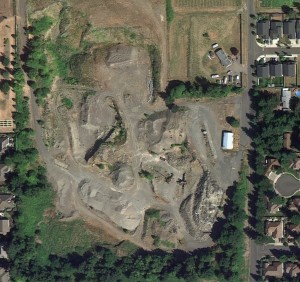Proposals to extend gravel mining operations in and around the Evergreen Pit have residents of Vancouver’s Countryside Woods neighborhood worried.
Situated on 19.42 acres just southwest of the intersection of NE 18th and NE 155th, the Evergreen Pit (formerly known as the Schmid Pit) began supplying the region with gravel years before the Countryside Woods neighborhood even existed.
When Vancouver annexed the area in 1997, it negotiated a development agreement (or DA) with the Schmid Family Limited Partnership – the current owners of the property – ensuring that mining activities could continue for a term of 15 years.Over that 15-year time frame, a residential community has grown and flourished on all sides of the Evergreen Pit. Property owners purchased and developed real estate in the vicinity under the assumption that, upon the DA’s expiration at the end of 2011, all mining operations would cease and a process of residential reclamation would begin.
Prior to the DA’s Dec. 31 expiration date, however, the present owners of the mining property, Tapani Underground Inc., sought an extension that would allow all the remaining gravel to be extracted from the pit.
To that end, Tapani representatives and city staff members drafted an amendment to the original DA that would authorize up to a year of additional mining followed by two years during which the pit would be filled, graded, and vegetated. Although this three-year extension has yet to be approved, the city has permitted mining to continue in the interim.
Air, fumes, noise pollution worries
The ongoing industrial operations in and around the Evergreen Pit are a matter of great concern for Tapani’s residential neighbors. Although the original DA contained provisions to minimize negative effects upon the surrounding community, many Countryside Woods residents are questioning the value of those provisions – as well as Tapani’s willingness to comply with them.
At a Feb. 27 City Council meeting, several concerned citizens were present to complain of airborne contaminates, diesel fumes, accumulating sediment and noise pollution from Tapani’s mining and industrial transportation operations.
Many of these concerns stem from Tapani’s apparent failure to adhere to agreed-upon modes of conduct and hours of operation. Although the company is obligated to limit its activities to the hours between 7 a.m. and 7 p.m., citizens have routinely witnessed mining and transportation procedures taking place as early as 6 a.m. and as late as 10:30 p.m.
Residents say that by extending its daily operations in this manner, Tapani is not only breaking its good-faith arrangement with the community at large but also increasing its overall production of noise, gas, and particulate pollution.
From his property adjacent to the Evergreen Pit, Countryside Woods resident Eric Gorger recently witnessed a Tapani truck idling on the street at 10:30 on a Saturday night. He is concerned not only with the pollution caused by these trucks, but the potential hazard that they pose to children at play in the neighborhood. Several residents speaking at the meeting echoed Gorger’s concerns, claiming that the amount of traffic as well as the speed at which these trucks travel should be considerably reduced.
Tapani promises limited impact on area
Tapani Project Manager Aaron Halling points to DA provisions that ensure public health and safety, insisting that the company is dedicated to “aggressive erosion control” and limiting its impact on the people and properties of Countryside Woods. The company has also undertaken preventative measures such as paving service roads and maintaining effective wheel wash facilities.
The City Council’s primary concern is that the proposed DA amendment fails to provide adequate quantifiable details. Several council members pointed out the vagueness of the plan as it currently stands. For example, Tapani has indicated that although the pit is on schedule to be completely mined out by the end of 2012, operations are likely to cease prior to that time as major construction projects like those on St. Johns and Highway 14 begin to ramp up over the summer months.
However, nothing in the language of the DA amendment directly addresses this issue.
Council member Jack Burkman pointed out that there is no legal stipulation preventing Tapani from taking on additional projects and maintaining heightened levels of mining activity right up to the deadline. Perhaps even more unsettling, the draft proposal as it currently stands allows for a possible 90-day extension into the year 2013 if the director of community development deems such an extension necessary.
In order to give Tapani and city staff adequate time to refine and clarify some of the DA amendment’s open-ended and indefinite provisions, the City Council ultimately decided to postpone its decision until March 4.
As 95 percent of the gravel that is extracted from the Evergreen Pit goes directly to construction projects within Vancouver city limits, local officials cannot disregard the essential importance of this local resource. The concerns of residents living close to this vital supply, however, must be regarded as equally important.
Council member Jeanne Stewart said she would be willing to approve the extension but certain “mitigating factors” must first be addressed to “make sure that the ongoing operation is something that…the neighbors can live with.”
Council member Larry Smith hopes that Tapani will take advantage of the weeklong effort to specify and “tighten up” the extension proposal by communicating directly with citizens. Ideally, Tapani would use the time to set up some manner of recurrent communications plan designed to keep concerned residents informed and involved.










